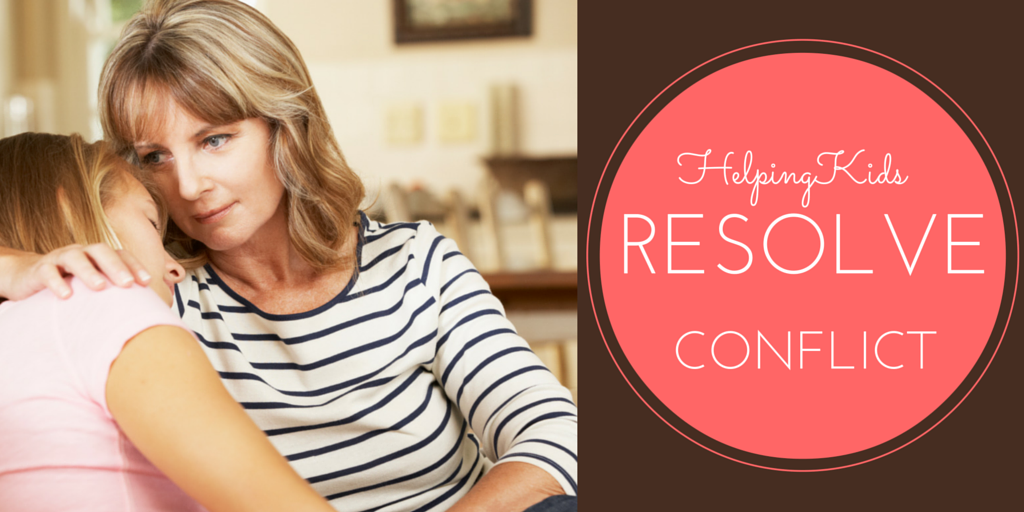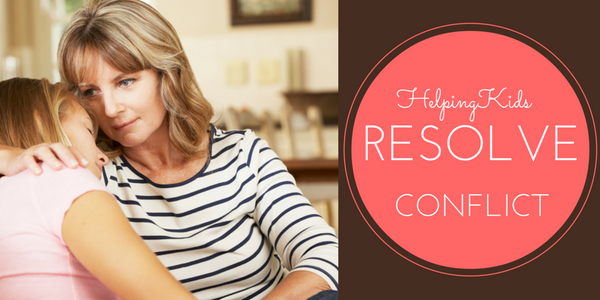
Helping Kids Resolve Conflict
Conflict happens. That is a guarantee. Resolving it is a skill we all need to hone. Unfortunately, most people don't have this skill and don't make an effort to acquire it. Resolving conflict isn't always pleasant, so many times even adults shy away from it.
If adults don't resolve conflict well, how can we expect our kids to do so?
First of all, we need to stop doing it for them. Rather, we need to show them how to face it head-on.
One of our children recently reached champion tattletale status. Seriously. It got to the point that we knew we needed to purposefully teach conflict resolution skills. Tattling is a huge pet peeve of mine, and I refuse to solve my children's problems for them, so we set out to instill better conflict resolution skills in our child.
To begin, we banished tattling (with the obvious exception of telling us about dangerous situations). We taught that when you have an issue with someone, you deal directly with that person only. Bringing an outsider into the situation should only be done as a last resort (and even then the outsider should be an unbiased facilitator, who helps the parties resolve the issue without taking sides). Tattling just shirks responsibility for finding a resolution to the parents, and I don't want to be my kids' judge and jury. I want to equip them to resolve issues themselves.
Here are the steps we worked through:
1. Don't react emotionally. No one ever responds to conflict well when they are emotionally charged. It's imperative to control anger and other emotions in order to resolve conflict. Don't react or respond unless you are calm.
2. Seek to understand. Many conflicts are created because we jump to conclusions. Ask the other person directly to explain their side of the situation. Many conflicts can be avoided or resolved simply by asking for clarity. Speak nicely, and don't make accusations.
3. Listen actively. Active listening means that we need to keep our mouths shut and ears open. Don't interrupt when the other person is talking. Don't sit there the whole time the other person is talking trying to formulate your response. Don't try to be right; just try to understand the other person's point of view.
4. Take responsibility. Even if you're right, take responsibility for your role in the conflict. Apologize that you hurt the other person's feelings. Saying "I'm sorry" goes a long way toward resolving conflict, even if the other person does not return the favor. Offer to make the situation right wherever you can.
5. Show grace. Give the benefit of the doubt whenever possible. Try to understand that everyone has bad days sometimes, and maybe something like that is at the root of the conflict. Mend fences whenever possible. Be kind. Be humble. Move on without holding a grudge.
After we walked through those steps, we did a little role playing. We talked through a few scenarios and possible ways to resolve them. We asked our child to describe what would be the best thing to do in each situation. We did our best to get this child thinking about good ways to resolve conflict. This is a journey and will take some practice.
We also needed to do a self-check on how we, as adults, are resolving conflict. We want to make sure we are modeling proper ways to resolve conflict in our own relationships. We want our kids to see how we do it, and not just hear the words we speak. Conflict resolution is a necessary life skill, and we hope we give our kids sufficient resources for the future. As a family, we can work on it together.



